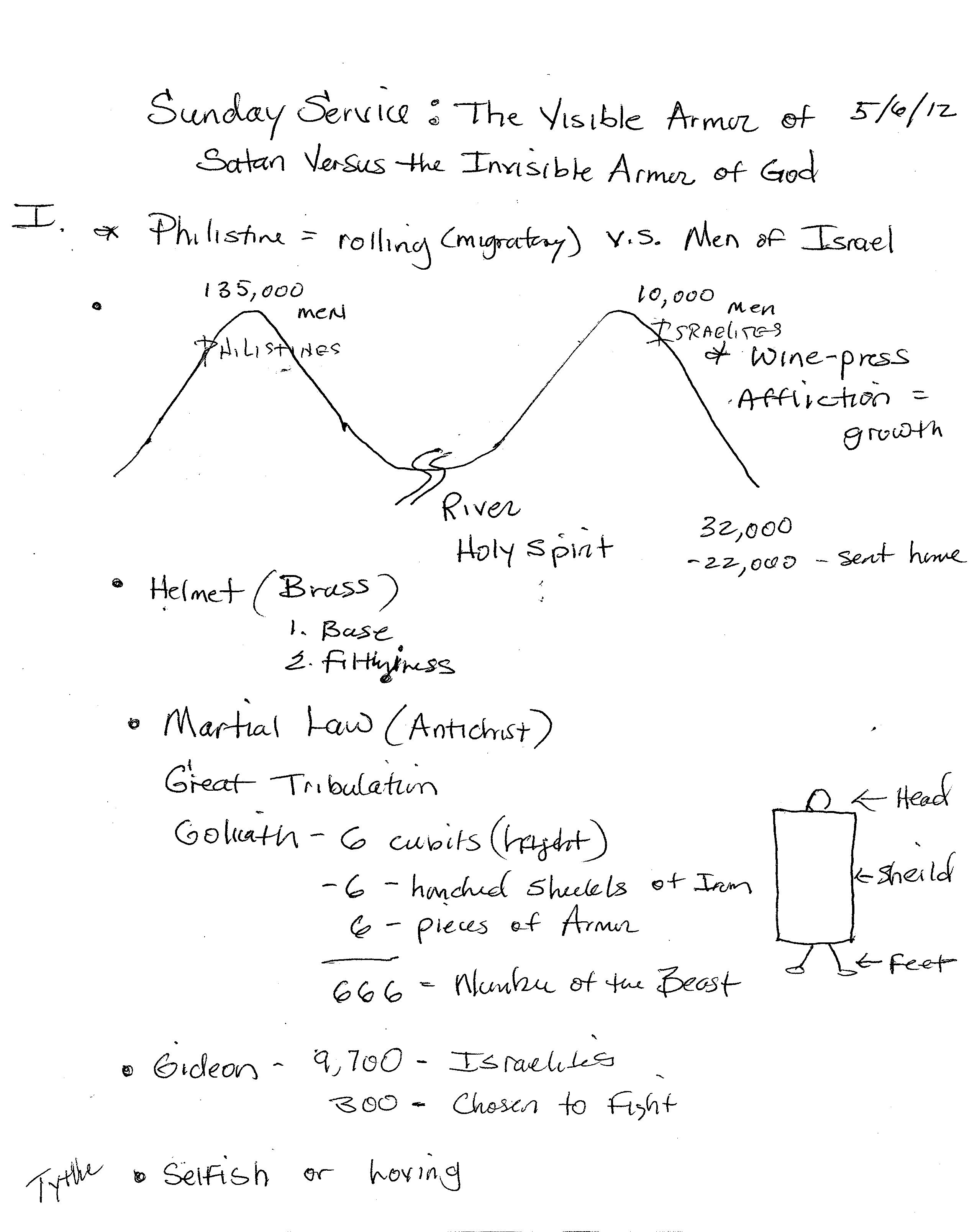Gideon |
Chapter 8 |
|
|
|
THE VISIBLE ARMOR OF SATAN VERSUS THE INVISIBLE ARMOR OF GOD 05-06-12 OPPONENTS IN THE WAR (TYPES AND SHADOWS) (1 Sam 17:1) Now the Philistines [Heb: rolling, migratory] [vs. the Israelites who are stable farmers, husbandmen married to the land: John 15:1] gathered together their armies to battle, and were gathered together at Shochoh [Heb: to entwine, shut in:--fenced], which belongeth to Judah [hence, the Philistines were the aggressive invaders, and the Israelites were the resistant defenders “standing” their ground: James 4:7 & Eph 6:11,13,14], and pitched between Shochoh and Azekah [Heb: tilled] [i.e., farming country], in Ephesdammim [Heb: boundary of blood-drops].
(1 Sam 17:2) And Saul and the men of Israel [Heb: he will rule as God] were gathered together, and pitched by the valley of Elah [Heb: an oak or other strong tree] [ref: Judg 6:11 “an oak” Heb: elah, where it is there a symbol of the cross], and set the battle in array against the Philistines.
THE ARENA, THE BATTLEFIELD (1 Sam 17:3) And the Philistines stood on a mountain on the one side, and Israel stood on a mountain on the other side: and there was a valley between them.
THE VISIBLE CHAMPION OF SATAN ENTERS THE ARENA (1 Sam 17:4-7) And there went out a champion [ref: “a beast” Rev 13:1, the antichrist] out of the camp of the Philistines, named Goliath, of Gath, whose height was six cubits and a span [physically huge at an 18” cubit = 9.3 feet tall, or, at a 25”cubit = 12.8 feet tall]. And he had an helmet of brass (1) upon his head [his thoughts were associated with/as brass], and he was armed with a coat of mail (2) [Heb: jointed pieces of overlapping brass like the scales of a fish]; and the weight of the coat was five thousand shekels of brass [weighing 194 ˝ lbs]. And he had greaves of brass (3&4) [Heb: a shin-piece of armor] upon his legs [two greaves, one greave upon each leg], and a target (5) [Heb: something to strike with; a javelin] of brass between his shoulders [“slung on his back” NIV]. And the staff of his spear (6) was like a weaver's beam [the thick heavy frame of a carpet loom]; and his spear's head weighed six hundred shekels of iron [weighing 23 ˝ pounds] [iron is symbolic of judgment]: and one [ref: the false prophet: Rev 13:11] bearing a shield went before him. 1. Goliath = Heb: exile /// to denude [Dict: to make naked or bare, strip] (espec. in a disgraceful sense); by impl. to exile (captives being usually stripped); fig. to reveal: uncover. 2. Gath = Heb: (in the sense of treading out grapes); a wine-press (or vat for holding the grapes in pressing them):--(wine-) press. 3. brass = Heb: copper; hence, something made of that metal, i.e. a coin, a fetter; fig. base (as compared with gold or silver):--brasen, chain, copper, fetter (of brass), filthiness /// copper:--brass, steel /// (perh. in the sense of ringing, i.e. bell-metal; or from the red color of the throat of a serpent when hissing); coppery, i.e. (fig.) hard:--of brass /// 5172. to hiss, i.e. whisper a (magic) spell; gen. to prognosticate:-- X certainly, divine, enchanter, (use) X enchantment. [symbolic of sin] a. base = Dictionary: 1. morally low; without dignity of sentiment; mean-spirited, selfish, cowardly. 2. characteristic of an inferior person or thing. b. (Gen 3:1) Now the serpent [Heb: 5172] was more subtle [Heb: cunning (usually in a bad sense):--crafty, prudent] than any beast of the field which the LORD God had made. And he said unto the woman, Yea, hath God said, Ye shall not eat of every tree of the garden? 4. Commentary: “and one bearing a shield went before him” = this apparently insignificant “one” is the false prophet (Rev 13:11) bearing a large shield intending, as much as possible, to hide the body of Goliath from visibility, excepting Goliath’s head (a talking head) and his feet (walking feet). However, observant eyes (Judg 7:5-7; 1 Pet 5:8) can see where, in what direction, Goliath is going, and where he has been from the evidence (debris, wreckage) left in his tracks.
|
